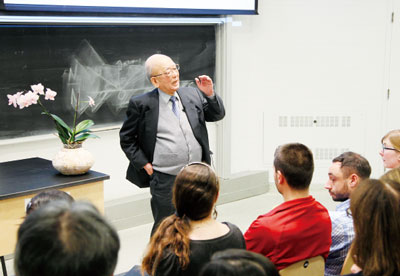Diplomatic Bluebook 2015
Chapter 3
Japan’s Foreign Policy to Promote National and Worldwide Interests
3.Science and Technology Diplomacy
Japan promotes “science and technology diplomacy” in various forms, utilizing its superior science and technologies in consideration of the current international situations, such as the growing influence of newly emerging states. In particular, Japan established the “Advisory Panel on Science and Technology Diplomacy”1under Foreign Minister Kishida in July 2014. The Advisory Panel discussed specific measures for further promotion of science and technology diplomacy.
- 1 The members of “Advisory Panel on Science and Technology Diplomacy”: Takashi Shiraishi, President, National Graduate Institute for Policy Studies (Chair); Masaru Iwanaga, President, The Japan International Research Center for Agricultural Sciences; Masafumi Kaneko, General Manager/Senior Research Fellow, Center for International and Strategic Studies, PHP Institutes, Inc.; Atsushi Sunami, Professor, Executive Advisor to the President, National Graduate Institute for Policy Studies; Mariko Hasegawa, Executive Director, Vice President, The Graduate University for Advanced Studies; Yuichi Hosoya, Professor, Faculty of Law, Keio University; and Mitsuhiko Yamashita, Member of the Board, Senior Technology Advisor to CEO, NISSAN MOTOR Corporation.
(1) Bilateral or Multilateral Cooperation to Promote Science, Technology and Innovation
With respect to bilateral cooperation, joint committees with six countries2, including the US, India, the UK, and Switzerland were held in 2014, based on the Science and Technology Cooperation Agreement3. The committees discussed the current situation of cooperation and the direction for future cooperation.
As for multilateral cooperation, Japan actively takes part in large-scale international science and technology projects, for example, the ITER project to construct and manage a thermonuclear experimental reactor.
- 2 The United States, Spain, India, the United Kingdom, Poland, and Switzerland.
- 3 Japan has signed or concluded 32 Science and Technology Cooperation Agreements which are applied to 47 countries/organizations.
(2) Utilization of Science and Technology as Means of Solving Global Challenges
Responding to various challenges for the international society is one of the important pillars of science and technology diplomacy. Japan supports joint research activities conducted by universities and research institutions in Japan and other developing countries through ODA (Science and Technology Research Partnership for Sustainable Development (SATREPS))4. It contributes to finding solutions for global challenges in the areas of Environment/Energy, Bioresources, Disaster Prevention and Mitigation, and Infectious Diseases Control. For example, in Zambia, researchers led by Professor Ayato Takada of Hokkaido University are working with researchers of the University of Zambia to find out the infection routes of the Ebola virus, etc., and the development of diagnosis methods.
- 4 Based on the needs of the developing countries, joint research and capacity building support are conducted by universities and research institutes between Japan and developing countries in areas such as Environment/Energy, Bioresources, Disaster Prevention and Mitigation, and Infectious Diseases Control by exerting the concerted efforts of MOFA, Ministry of Education, Culture, Sports, Science and Technology (MEXT), JICA, the Japan Science and Technology Agency (JST).
(3) Promotion of Bilateral Relations through Science and Technology Cooperation
The enhancement of cooperative relations in the area of science and technology brings benefits to both Japan and its partner countries, broadening their bilateral relationship. Since each country is facing different circumstances of Science and Technology, it is necessary to take Japan’s strength and the needs of the partner country into consideration. For instance, at the 14th U.S.-Japan Joint Working-Level Committee (JWLC) Meeting on Science and Technology Cooperation in July 2014, Japan hosted the 2nd Open Forum for STIE (Science, Technology, Innovation and Education) Cooperation following the intergovernmental meeting. At the forum, experts of academia and industry from both countries discussed scientific knowledge, decision-making, and the development of innovative human resources. Also, the aforementioned joint research associated with ODA contributes to advancing bilateral relationships between Japan and developing countries.
(4) Promotion of “Soft Power” as a Science and Technology-Oriented Country
Japan’s superior science and technology, as well as culture, helps to promote other country’s understanding of Japan and improve its image for other countries. In 2014, Japan sent distinguished Japanese scientists for example in the areas of cross-coupling reactions5, and material engineering to 11 countries in Europe, North America, and Asia6 for networking among researchers and promoting public diplomacy through their presentation on some advanced researches.
 Lecture by Akira Suzuki, professor emeritus of Hokkaido University (the 2010 Nobel Prize winner in Chemistry) (photo by Owen Egan, courtesy McGill University)
Lecture by Akira Suzuki, professor emeritus of Hokkaido University (the 2010 Nobel Prize winner in Chemistry) (photo by Owen Egan, courtesy McGill University)
- 5 A chemical reaction producing one molecule by bonding two molecules with different structures. Akira Suzuki, professor emeritus of Hokkaido University, devised the “Suzuki Coupling,” a palladium-catalyzed carbon-carbon bond forming reaction, and was awarded the 2010 Nobel Prize in Chemistry. “Suzuki Coupling” contributes widely to society, including stomach medicine, agrochemical, liquid-crystal displays, and LED lights. Since Professor Suzuki did not obtain the patent right for this technology, this technology has been spread and a number of application products have been commercialized.
- 6 Germany, the United Kingdom, Ireland, Canada, Lithuania, Estonia, Poland, Czech, Slovakia, Hungary, and Sri Lanka.
